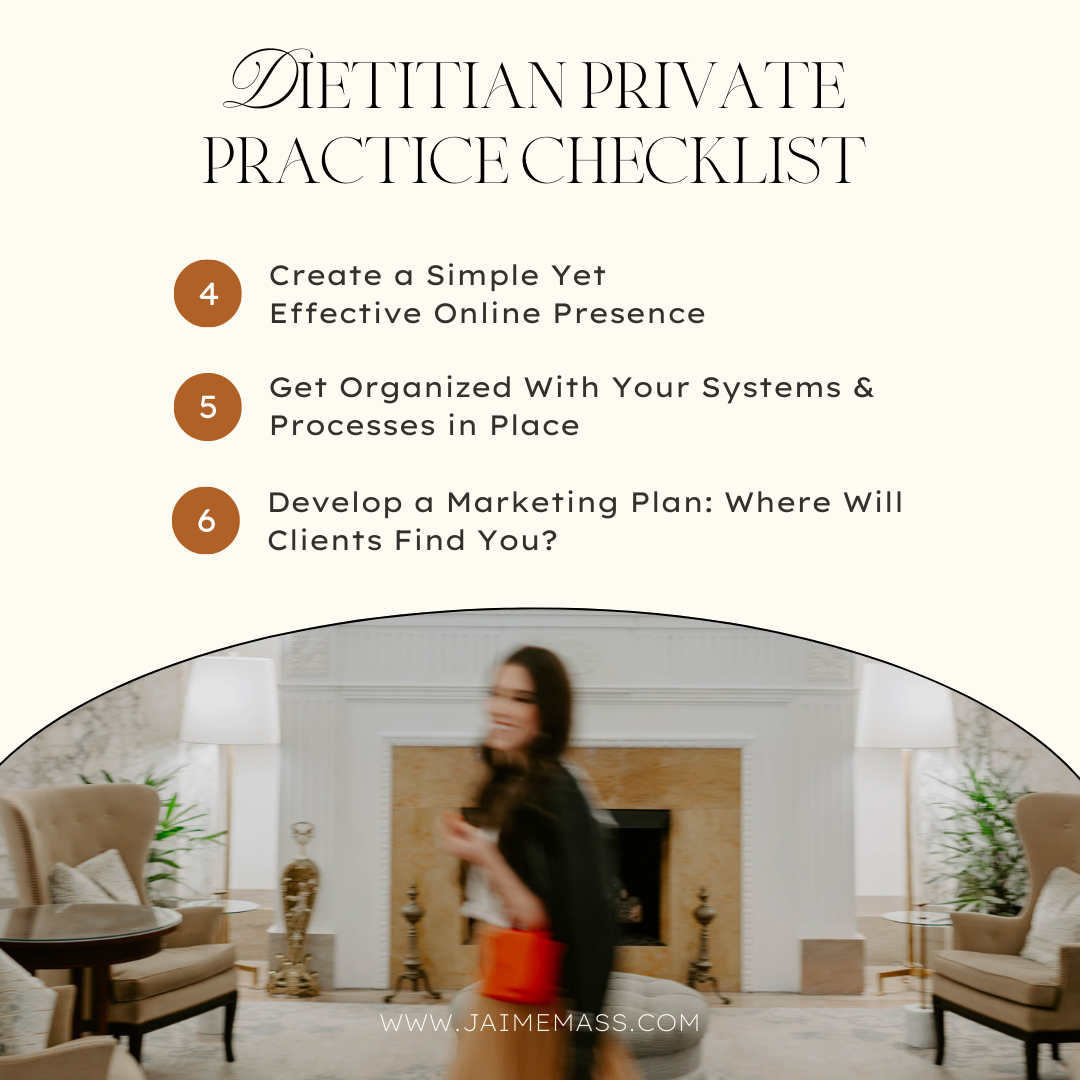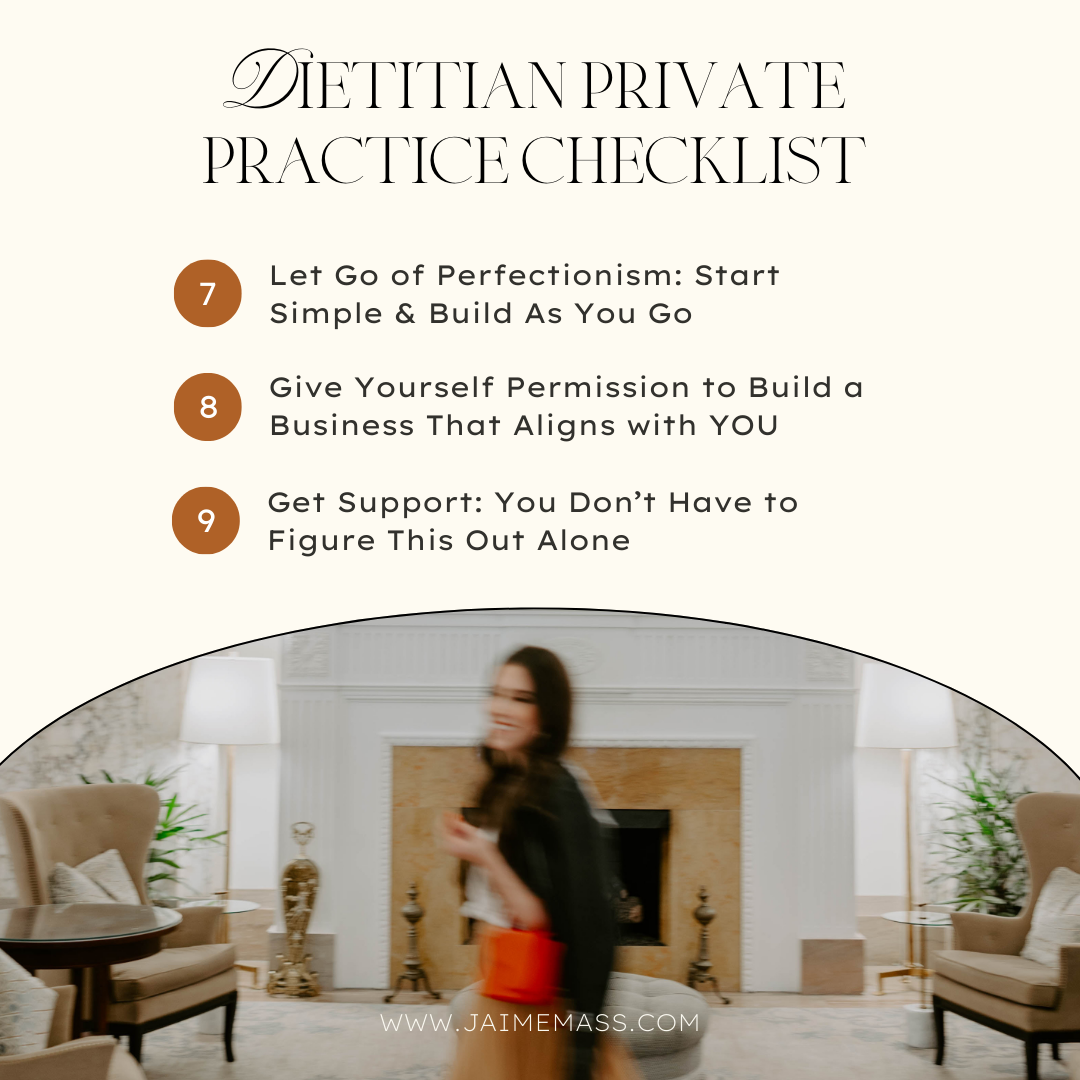Dietitian Private Practice Checklist: A Roadmap to Building a Business That Works for YOU
Starting a private practice as a dietitian can feel overwhelming—especially when you’re staring down a “private practice checklist” that’s packed with business tasks, paperwork, and legal to-dos. And yes, there are some important pieces to put in place, but let’s be real: your nutrition practice doesn’t have to fit into a traditional box.
You don’t need to have every detail figured out before you begin. Instead, focus on building a business that works for you—one that supports your lifestyle, honors your energy, and aligns with the kind of impact you want to make. This checklist is your bird’s-eye view of what you need to start strong, without getting caught up in perfectionism or burnout. Let’s get started!
The Essentials of Starting a Private Practice as a Dietitian
1. Define Your Niche & Who You Serve
A successful private practice starts with one thing: clarity. You need to know exactly who you help and what problem you solve. If you’re coming from the clinical world, you might be used to seeing a wide variety of cases—cardiac one day, renal the next. That constant shuffle can be exhausting, and it’s one of the reasons so many dietitians feel burnt out. Private practice thrives on focused, niched down client work. You don’t have to serve everyone—you just need to serve the right people.
So ask yourself: What nutrition challenge am I most passionate about solving? Is it gut health, weight loss, hormones, or something else entirely? And who do I truly love working with? Maybe it’s college students, busy moms you relate to, or former athletes like yourself. The more specific you get, the better! Get clear on their age, struggles, lifestyle, even location if it’s relevant.
For example, a highly refined niche might be former female athletes struggling with body image and learning how to fuel their now less-active lifestyle. Compare that to a general “sports nutrition” niche—it’s clear which one stands out and speaks directly to someone’s lived experience. That level of detail positions you as the expert they’ll want to work with!
And finally, ask yourself, how do I want to work with people? 1:1 sessions, group programs, courses, maybe a mix? There’s no one-size-fits-all answer here, but most dietitians start with one-on-one to build experience and confidence before branching out.
2. Choose a Business Structure & Get Legal Basics in Place
One of the first big steps (and let’s be honest, one of the most intimidating for many dietitians) in setting up your private practice is choosing a business structure. But don’t stress—it’s not as complicated as it seems. I mean, if you made it through memorizing the Krebs cycle, you can absolutely handle this!
Most dietitians start with an LLC because it’s simple, flexible, and offers personal liability protection. If you’re just dipping your toes in, you might start as a sole proprietor, and down the line, you can look into switching to an S-Corp for potential tax advantages. Each structure has its pros and cons, so take some time to explore your options—or talk to a tax pro if you want personalized advice.
Next, apply for an EIN (Employer Identification Number). This is basically your business’s version of a Social Security number, and it’s required for taxes, hiring, and opening a business bank account. The good news? It’s totally free and super easy to apply online through the IRS website.
Once you have your EIN, open a separate business bank account. Trust me—you’ll thank yourself later when tax season rolls around. Keeping your business expenses separate makes it way easier to track things like your EMR (I love Practice Better for that), professional email or Zoom accounts, LLC registration fees, and any other recurring costs.
Lastly, look into business insurance. Liability protection is essential, especially when you're working with clients in a healthcare-related space. I recommend checking out Proliability—it’s a quick sign-up, and you can get a quote in just a few minutes.
3. Pricing & Packages: Set Up a Business Model That Supports You
Let’s talk pricing—because this is where a lot of dietitians default to old-school thinking. You don’t have to (and I actually don’t recommend) charging per session like you’re still in a clinic. Instead, build a business model that actually supports your time, energy, and goals. High-value coaching packages are a great place to start. Think 3- to 6-month commitments with flexible payment plans or a pay-in-full option at a discounted rate. These allow you to guide clients through real transformation—not just quick fixes AND it leads to recurring revenue for you!
You can also explore group coaching to scale your impact while avoiding the burnout that can come with back-to-back 1:1s. Or go hybrid: offer a mix of consulting, passive income (like courses or downloads), and coaching.
Remember—your pricing should reflect your expertise and the transformation you provide, not just your time. Your packages might include things like messenger support, meal journal reviews, or personalized feedback between sessions, so don’t undersell your value. (If you want help creating dreamy, aligned offers, I go deeper into this inside The Foundation® program.)
Setting Up Your Dietitian Private Practice for Success
4. Create a Simple Yet Effective Online Presence
You don’t need a fancy website with all the bells and whistles to get started—what you do need is a clear, intentional online presence that speaks directly to the people you want to help.
A simple website or business-focused social media account can go a long way. Start by clearly sharing who you help and what you offer. And no, this doesn’t mean just listing your credentials. Go deeper. Share your why—why you’re passionate about nutrition, why you care about your clients, and what kind of transformation they can expect from working with you. Instead of saying “I offer 6 weekly sessions,” say something like, “I help busy women heal their gut and feel energized again—without obsessing over food.” It’s the TRANSFORMATION that matters!
Wherever you choose to market yourself, make it easy for people to take the next step. Include just one or two clear offers (you don’t need a full menu of services) and a strong call to action like “Book a free discovery call” or “Apply to work with me.” Even a simple contact form or direct email is enough to get started. I typically recommend offering a discovery call—it’s a great way to connect, build trust, and ensure it’s a good fit on both sides.
And don’t forget—go ahead and claim your business name on social media platforms, even if you’re not posting regularly yet. It’s smart to reserve your handle early so you’re ready when the time comes.
5. Get Your Systems & Processes in Place
Before you bring on clients, make sure your backend is set up to run smoothly—because systems are what make your business feel legit and help you show up like the pro you are. Start with a simple scheduling system like Calendly or Practice Better so clients can easily book sessions without the back-and-forth emails. Next, set up payment processing through platforms like Stripe or Square so you can start collecting payments in a secure, professional way.
You’ll also want to think through how you’ll handle paperwork. Intake forms, contracts, and client notes are essential to keeping things compliant and organized. Many EHR platforms—like Practice Better—offer all-in-one solutions for this, including scheduling, charting, and even billing. If you’re not ready to invest in a platform yet, Google Drive for Business can work as a starting point for securely storing and managing client files.
The Most Overlooked Part of Private Practice—Marketing & Getting Clients
6. Marketing: Where Will Clients Find You?
You don’t need to be everywhere—you just need to be where your ideal clients already are. Think about who you’re trying to reach. Is it a bariatric patient scrolling Facebook groups feeling totally overwhelmed? Or maybe a Gen Z struggling with disordered eating and spending hours on TikTok? The key is to pick 1–2 marketing strategies that align with both your audience and your energy.
If you love writing, blogging and SEO can help clients find you through Google searches. If you enjoy being on camera or sharing quick, engaging content, platforms like Instagram, TikTok, or Facebook are great for building connection and visibility. More of a people-person? Networking and building partnerships with doctors, personal trainers, or other wellness pros can be a powerful way to get referrals. And don’t sleep on email marketing—it's one of the best ways to build trust and stay top of mind with potential clients. A lot of dietitians use social media to grow their email list, so the two can work hand in hand.
7. Start Simple & Build As You Go
You don’t need a flawless website, a perfectly curated Instagram with 10k followers, or all your systems dialed in before you start. In fact, trying to wait until everything’s “perfect” is one of the fastest ways to stall your momentum. Your business will evolve as you grow—so give yourself permission to take messy action. That’s how your dream practice actually comes to life.
Start with one core offer—whether that’s 1:1 coaching, a signature program, or a small group. Choose one or two marketing platforms where your ideal clients are already hanging out, and set up a simple, streamlined way for people to book and onboard with you. That’s truly all you need to begin. From there, you can refine, add, and expand as your confidence and clarity grow.
The Mindset Shift Every Private Practice Dietitian Needs
8. Give Yourself Permission to Build a Business That Aligns with YOU
The biggest mistake new private practice dietitians make? Believing there's a “right” way to do it. Spoiler alert: there isn’t. Private practice is not one-size-fits-all—and that’s the beauty of it. Your business should reflect your strengths, lifestyle, and goals. Don’t love dancing on Reels? Then don’t. Just because someone else is offering group programs or launching a course doesn’t mean you have to follow suit. If you thrive in deep, 1:1 conversations, you can absolutely build a fulfilling, high-impact private practice without burning out.
You also don’t have to see clients back-to-back to be successful. You don’t have to take insurance if it doesn’t align with your vision. And you definitely don’t need to work 40-50+ hours a week just to feel legit. You’re allowed to create a schedule, structure, and set of boundaries that actually support the life you want. That’s the whole point!
9. You Don’t Have to Figure This Out Alone
Starting a private practice without guidance can feel like a lot to handle—but that’s exactly why The Foundation® exists. You don’t need more Google searches or endless scrolling through dietitian Facebook groups. What you really need is a clear, step-by-step roadmap paired with the support you deserve to build a private practice that actually works for you.
Your Dietitian Practice Starts with One Step
This private practice checklist is just the beginning. The most important part is to start. You don’t have to be 100% ready—you just need a plan, the right support, and the confidence to take that first step.
Ready to make that first step? Join The Foundation® and get expert guidance, a proven roadmap, and all the support you need to build a nutrition private practice that aligns with your life and vision. I can’t wait to help you build your RD dreams, love!
Disclaimer: This post/site contains affiliate link(s). When you click and make a purchase and/or sign up at a site through a link I've provided, I may make a small commission on your purchase at no additional cost to you.




